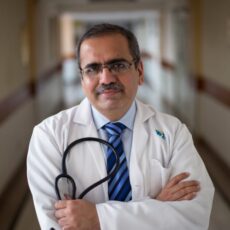Gastroenterology Treatments

What is Gastroenterology?
A gastroenterologist is a medical doctor who specializes in diagnosing, treating, and managing diseases and disorders that affect the digestive system. The digestive system includes the esophagus, stomach, small intestine, large intestine (colon), rectum, liver, gallbladder, and pancreas.
Gastroenterologists are trained to perform various diagnostic procedures and treatments, including endoscopy (a procedure that involves inserting a thin, flexible tube with a camera into the digestive tract), colonoscopy (a procedure that examines the inside of the colon), and liver biopsy (a procedure that involves removing a small sample of liver tissue for analysis).
Common conditions that gastroenterologists diagnose and treat include acid reflux (heartburn), ulcers, inflammatory bowel disease (Crohn’s disease and ulcerative colitis), celiac disease, irritable bowel syndrome (IBS), liver diseases (such as hepatitis and cirrhosis), and pancreatic diseases (such as pancreatitis). They also play a role in cancer prevention and screening for digestive tract cancers, such as colon cancer.
What is Mean by Gastroenterology/GI medicine?
Gastroenterology, also known as GI (gastrointestinal) medicine, is a medical specialty that focuses on the digestive system and its disorders. This includes the esophagus, stomach, small and large intestine, liver, pancreas, and gallbladder.
Gastroenterologists, who are medical doctors specializing in gastroenterology, diagnose, manage, and treat a wide range of digestive system disorders, such as acid reflux, ulcers, inflammatory bowel disease, celiac disease, irritable bowel syndrome, liver diseases, and pancreatic diseases.
GI medicine also involves the use of diagnostic procedures and treatments, such as endoscopy, colonoscopy, and liver biopsy. Gastroenterologists may also work closely with other specialists, such as surgeons, oncologists, and nutritionists, to provide comprehensive care to patients with digestive system disorders. Overall, gastroenterology is a vital field in maintaining digestive health and preventing and treating gastrointestinal diseases.
When Should You Consult a Gastroenterologist?
You should consult a gastroenterologist if you are experiencing any persistent or concerning symptoms related to your digestive system. Some common symptoms that may warrant a visit to a gastroenterologist include:
- Abdominal pain or discomfort
- Persistent diarrhea or constipation
- Unexplained weight loss or gain
- Blood in your stool or black, tarry stools
- Difficulty swallowing
- Heartburn or acid reflux that does not respond to over-the-counter medications
- Nausea or vomiting
- Bloating or gas
- Chronic or recurring indigestion
In addition, you should see a gastroenterologist if you have a family history of digestive system disorders or have previously been diagnosed with a gastrointestinal condition such as inflammatory bowel disease or celiac disease. Gastroenterologists can perform diagnostic tests and procedures, provide expert advice on managing symptoms, and develop a personalized treatment plan to help you achieve optimal digestive health.
What Conditions Do Gastroenterologists Treat?
Gastroenterologists are trained to diagnose and treat a wide range of conditions that affect the digestive system. Some common conditions that gastroenterologists may diagnose and treat include:
Acid reflux or gastroesophageal reflux disease (GERD): a condition where stomach acid flows back into the esophagus, causing heartburn and other symptoms.
Ulcers: open sores that develop in the lining of the stomach or small intestine, often caused by a bacterial infection or long-term use of nonsteroidal anti-inflammatory drugs (NSAIDs).
Inflammatory bowel disease (IBD): a group of chronic inflammatory conditions that affect the digestive tract, including Crohn’s disease and ulcerative colitis.
Celiac disease: an autoimmune disorder where the body cannot tolerate gluten, a protein found in wheat, barley, and rye.
Irritable bowel syndrome (IBS): a common digestive disorder that causes abdominal pain, bloating, constipation, and diarrhea.
Liver diseases: a range of conditions that affect the liver, such as hepatitis, cirrhosis, and fatty liver disease.
Pancreatic diseases: conditions that affect the pancreas, such as pancreatitis and pancreatic cancer.
Colon cancer: gastroenterologists play a key role in screening for colon cancer and diagnosing and treating the disease in its early stages.
In addition, gastroenterologists may also diagnose and treat other less common digestive system conditions, such as gastroparesis, diverticulitis, and motility disorders.
Types of Processes Followed by a Gastroenterologist
Gastroenterologists use a variety of processes to diagnose and treat digestive system disorders. Here are some common processes followed by a gastroenterologist:
Endoscopy: This is a procedure where a thin, flexible tube with a camera on the end is inserted through the mouth or rectum to examine the esophagus, stomach, and small and large intestine.
Colonoscopy: This is a procedure where a long, flexible tube with a camera on the end is inserted through the rectum to examine the colon and rectum. Colonoscopy is commonly used to screen for colon cancer.
Biopsy: During endoscopy or colonoscopy, a gastroenterologist may take a small sample of tissue for analysis. This is called a biopsy and can help to diagnose certain digestive system disorders.
Imaging tests: Gastroenterologists may use imaging tests such as X-rays, CT scans, and MRI scans to get a detailed view of the digestive system and identify abnormalities.
Blood tests: Blood tests can be used to diagnose certain digestive system disorders, such as celiac disease or liver diseases.
Medications: Gastroenterologists may prescribe medications to manage symptoms or treat specific digestive system disorders.
Surgery: In some cases, gastroenterologists may recommend surgery to treat digestive system disorders, such as removing a polyp during a colonoscopy or removing the gallbladder.
Overall, gastroenterologists use a combination of diagnostic tests, medications, and procedures to diagnose and treat a wide range of digestive system disorders.

Dr. Sudeep Khanna
MBBS, MD, DM

Dr. Yogesh Batra
MBBS, MD, DM

